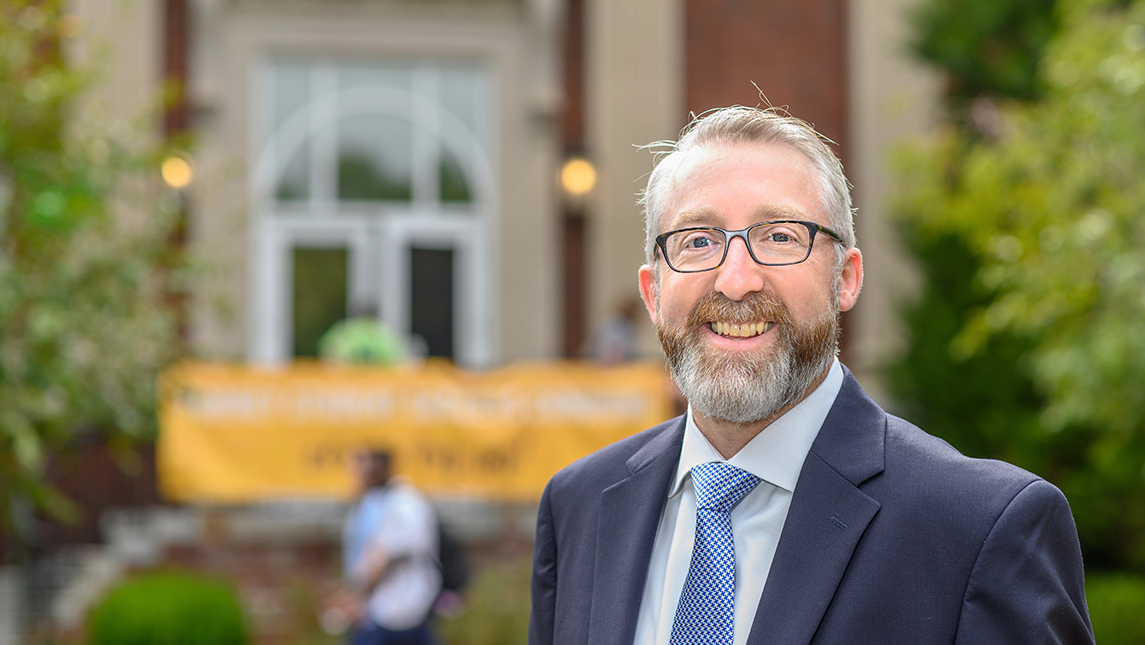
Student success has become a buzzword in higher education. But at UNC Greensboro, it’s really at the core of what we do.
It’s not just about getting students to campus – it’s about retaining students, helping them find academic success, ensuring they graduate on time, and supporting them in their professional aspirations.
Last year, UNCG made some big changes to better support student success efforts. The University created a new Division of Student Success. It opened a new Student Success Commons right in the heart of campus. And it welcomed a new leader: Dr. Andrew Hamilton, associate vice provost of student success and dean of undergraduate studies.
With the vast majority of University operations now online due to COVID-19, what does this mean for student success programs and initiatives? How can students still make sure they are getting the support they need?
In the Q&A below, Hamilton answers these questions and offers words of encouragement to students.
Broadly speaking, how is COVID-19 impacting student success?
When COVID-19 was recognized as a pandemic in March, we couldn’t just declare the semester over. We’re mandated to deliver a certain number of instructional minutes per term in every course. So, we had to find some way to finish the term, even though we knew that many students were not going to be in learning environments that were conducive to their best performance.
What we did was try to maintain academic rigor, while giving students a lot more control over their academic options. They now have a Satisfactory/Unsatisfactory grading option which protects their GPAs. They also have the option to withdraw without academic penalty until June 1. We did what we could to put them in control of their immediate academic futures, while at the same time meeting the requirements of the UNC System and our accreditors.
We knew that a lot of our students were going to have connectivity problems. Many didn’t have internet access that would facilitate the viewing of a lot of video content. We did what we could to alleviate those situations, and our team in ITS did a great job. I don’t know of even one case in which a student told us about a problem with access to the internet or a suitable device that we were not able to solve.
My main concern is that this disruption may be a nudge off the trajectory toward completion for a lot of students. Why? Uncertainty, stress, problems at home, and a hundred other little, but important, things. For students who already come from disadvantaged backgrounds, it doesn’t take a lot of nudges to move them off the pathway. Students now have new ways to manage their academic loads and their GPAs, but they still have to find the motivation to complete courses at a distance.
What are we doing to help students stay on track? What resources are still available?
That’s just it: We’re really delivering emergency remote instruction. These are not fully-developed online courses. We’re delivering instruction at a distance – that we built very quickly – because we didn’t want students’ academic progress to be disrupted by the pandemic any more than was absolutely necessary.
Do we have all the bells and whistles and supports that we need? No. But what we’ve been doing in my shop is supporting faculty and students as best we can as they make the transition.
The Academic Achievement Center is offering online tutoring and supplemental instruction. We still have academic recovery for students who were struggling in prior terms. The Writing Center, the Speaking Center, and the Digital ACT Studio are all operating virtually. And academic advising is going along as planned; students are currently enrolling for the summer and fall terms.
Financial Aid has set up a call center. They’ve rerouted their phones to their houses and are fielding hundreds of calls a week. Money is even tighter now, and some students have financial situations that have changed just in the last few weeks in ways that are not reflected in the current year’s or prior year’s taxes.
As we transition to the summer term, we’re hoping to have a much better footing for supporting students in an online environment. If we have to be online in the fall, or for part of the fall, I’m determined to be out of crisis mode and into high quality service-delivery mode for student success support.
Students can learn more about these resources at success.uncg.edu.
What’s your message to students?
We have asked and strongly encouraged instructors to be flexible and forgiving. At the same time, we’re asking students to be flexible and forgiving with their instructors. It has to go both ways. We’re all in this together.
Hang in there. We’re hearing that students are having a lot of trouble with motivation. They don’t have the academic structure they’re used to. I get it. But if they hang in there and do their best to get the work done, and if they exercise the new options they have, we’re hoping they can use this term to make all the academic progress they hoped for.
I also want to make a pitch for summer. Students who dropped hours in the spring should know that summer is a great time to make them up. The vast majority of summer courses were designed from the start to be online. They are fully formed and ready to go!
Extra: Listen to Hamilton’s interview on supporting student (and faculty) success during the pandemic on the recent “Yes, and Cafe” podcast.
Interview by Alyssa Bedrosian, University Communications
Photography by Martin W. Kane, University Communications


